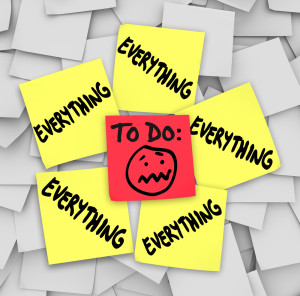This is the third in our series about The Seven Deadly Entrepreneurial Sins. You can start from the beginning here.
Gluttony is the second of the Operational Sins; those that reduce your personal effectiveness as an owner and the leader of your company. There are a number of indicators that you might be guilty of Gluttony.
- You are the first person to arrive every morning
- You’re the last one to leave at night
- You work weekends, but your employees don’t
- Your “to do” list can’t fit on one sheet of paper
- Even when you use columns
- You only work on the next deadline
- All of the above
 The glutton entrepreneur takes pride in being able to do every job in the company better than anyone else. His or her answer to problems and delays is “Never mind, I’ll just do it myself.”
The glutton entrepreneur takes pride in being able to do every job in the company better than anyone else. His or her answer to problems and delays is “Never mind, I’ll just do it myself.”
The worst sign is when you cringe at a big new sale, because it only means more work for you.
The Entrepreneurs “Catch-22” goes something like this:
“I could make this company take off if only I had one more really good employee, but good people cost more than we can afford right now, so I can’t make that key hire until we grow just a bit more, but I can’t see how we are going to grow, because I’m working as hard as I can right now, and I can’t accomplish any more until I have one more good employee.”
If this sounds like you, then it’s a good bet that your employees have been trained to delegate up. Delegation is the business virtue that counters entrepreneurial Gluttony.
My thanks to Ken Blanchard and William Oncken Jr. For their book The One Minute Manager Meets the Monkey. Now celebrating its 25th anniversary of publication, it’s still one of the best “how to” guides on delegation. (and remains in Amazon’s top 10,000 sellers.)
Employees will delegate to you if you let them. It’s not like they say “Boss, I’m assigning this to you.” Instead, they appeal to your ego as chief problem-solver and decision-maker.
“Hey Boss, we’ve run into a problem,” “They still haven’t gotten back to me.” “I’m not sure what to do next.” “You know more about this than I do.” Rest assured, your employees have learned the code that makes you stop what you are doing and dash to the nearest phone booth (good luck with that!) to put on your Superman cape.
Blanchard and Oncken describe four simple steps for effective delegation.
Develop a straddle reflex, and define the next step. Be especially careful of the word “we.” If you didn’t have the problem before this conversation, why should it be yours when it’s over? Employees who aren’t accustomed to problem-solving can’t think through every iteration of possible outcomes. Start by getting them to determine the next step, so that the action required seems more manageable.
Assign responsibility. Sometimes it really is your problem. If not, get the employee’s acknowledgement that he or she is the one who will make the next (clearly defined) move.
Insure the risk. The outcome of every decision has implications. If the risk is low, tell the employee to act and then inform you of the results. If the risk is high, make sure you OK the next move before it is implemented.
Schedule the follow up. The employee should understand clearly that the next move has a specific time frame for action. Put a follow up meeting on the calendar (and stick to it.) If you feel the employee is procrastinating, move the meeting forward.
You have to take smaller steps at the beginning. As your employees learn that you won’t take the problems off their hands, they will bring fewer of them to you. As they learn to tackle issues in steps, they will be able to go longer between follow ups.
Building a system for teaching others to work without your constant input frees you focus on the things that will move your Personal Vision forward. Tackle Lust first, then Gluttony. You can only tackle broader challenges in your business after you’ve dealt with your personal effectiveness.
Next week we’ll start the Tactical Sins; Sloth, Wrath and Greed.
Do you like what you are reading? Please share it with another business owner.
 Lust is the sin that springs from a lack of self-control. As an owner, few people in your business (if any at all) say no to you. They ask, “Boss, did you do that really important thing you were supposed to do yesterday?” You respond, “No, because something more important came up.”
Lust is the sin that springs from a lack of self-control. As an owner, few people in your business (if any at all) say no to you. They ask, “Boss, did you do that really important thing you were supposed to do yesterday?” You respond, “No, because something more important came up.” There is something to be said for any concept that catches the public imagination for fifteen centuries. First postulated by Saint John Cassian around 400 AD, the sins were codified by Pope Gregory the Great in the late sixth century, and popularized by Dante Alighieri in “The Divine Comedy” in 1315. They remain present on a daily basis in many businesses through the 21st century, 700 years on.
There is something to be said for any concept that catches the public imagination for fifteen centuries. First postulated by Saint John Cassian around 400 AD, the sins were codified by Pope Gregory the Great in the late sixth century, and popularized by Dante Alighieri in “The Divine Comedy” in 1315. They remain present on a daily basis in many businesses through the 21st century, 700 years on.
